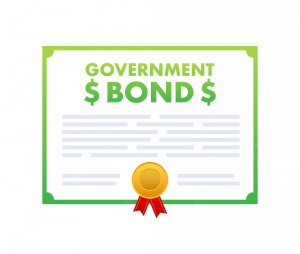Disclosure: Privacy Australia is community-supported. We may earn a commission when you buy a VPN through one of our links. Learn more.
How to Buy Bonds in Australia

Any professional investor’s education should include guidance on acquiring bonds.
Equities and fixed income tend to be distributed together in a well-diversified investing plan, allowing traders to withstand turbulence while still making gains along the way.
While there is speculation that treasury bills will perform much better than stocks, this article isn’t financial advice. I intend to examine the fundamentals of purchasing bonds in Australia.
Table of Contents:
- 💸 Why Invest In Bonds
- 💸 How Australian Bonds Work
- 💸 How to Buy Bonds
- 💸 Bond Buying Risks
- 💸 FAQs
- Takeaway
At a Glance 📚: How to Buy Bonds in Australia
- Bonds are fixed-income instruments that serve as a representation of obligations, making you—as one of the holders of bonds—a lender or creditor.
- Since bonds differ from stocks in several ways, most traders should diversify their holdings by including both in their portfolios.
- Although it might be simpler to acquire a mutual fund or ETF that specialises in bonds, several brokers now allow customers to buy individual bonds online.
- Without using a broker, you can buy government bonds directly from websites supported by the government.
- For citizens of some communities, municipal bonds may provide income that is tax-exempt.
Want a simple way to access bonds? 📙 Top ETF apps for 2024
Why Invest In Bonds?

Bonds can be a fantastic investment choice for prospective traders since they frequently provide a consistent cash flow.
A well-diversified bond fund may offer a regular income stream which is better yielding than money market funds and with less instability than stocks.
Today, bonds are favoured by many people, even when rates of interest are low, because of the relative peace of mind they provide. That’s compared to other investments like equities, let alone the extreme peaks and troughs of crypto.
According to Rich Powers, Head of Vanguard’s ETF Product Management division, fixed-income investing aims to add fund variety. “Stocks fell almost 13% in the year 2022, according to the US stock market’s return. US financial bonds increased by a little over 5%.”
This is significant because a diversified portfolio of stocks and bonds enables investors to experience less volatility.
Similar events have occurred in Australia, where bonds are now a more appealing investment due to the AU share market’s 13% decline since 2022’s beginning. Bonds are regarded as a “safe pair of hands” by many traders—the government has never missed a bond’s primary or interest obligation.
Due to that reliability, it is quite usual for Australians’ default superannuation funds to include bond exposure.
Did You Know? 💡 📰 By Dec. 2022, Amazon (AMZ) stock halved (45%) in value and Tesla (TSLA) saw a 🔥 $600 billion plummet.
- Learn more… What Are Government Bonds? ⭐
How Australian Bonds Work

Bond investing is kind of like lending money (you are the lender) in exchange for recurrent payments, or “coupon interest payments.” According to Moneysmart, all bonds see an agreed-upon face value upon being created, and if you retain the bond until it matures, you will get its face value (or principal).
A bond’s market price, which may be lower or greater than the face value, will be received if you trade it before it matures.
Government bonds and corporate bonds are the two main categories of bonds. The riskier of the two, corporate bonds, will be discussed first.
Corporate
Corporate bonds are a mechanism for big businesses to acquire capital to fund their initiatives. They are often issued and exchanged on the over-the-counter (OTC) market. It is uncommon for the everyday mom-and-pop trader to invest in corporate bonds—that’s because the required minimum investment is frequently in the $100,000’s range.
Government
Unlike semi-bonds, which may only be purchased and sold through state and territory treasury companies, the regular Australian government bond (AGB) promises a rate of return on the bond’s value when held to maturity.
Exchange-traded Treasury Bonds (eTBs) are a popular choice for investors seeking a consistent return on their bonds. You may invest in this fashion on the ASX in two different ways: ordinary (eTBs) or Treasury Indexed Bonds (eTIBs).
What distinguishes the two, then?
You can purchase or sell Exchange-traded Treasury Bonds (eTBs) whenever the 🏛️ ASX (Australia’s premiere exchange) is available and receive coupon interest payments, which are typically made every half-year. These securities have a set yearly interest rate and offer bond ownership through CHESS Depositary Interests (CDIs)—when the bond matures, the investor is given their loan back.
- Understand the ASX…🏢: What is Australia’s ASX?
How to Buy Bonds

The common investor may access the bond market in a variety of ways, and I’ve included some of the more popular options below:
Through a dealer: You will probably need to use a broker’s services if you wish to purchase bonds that are not exchanged openly. Stockbrokers can assist you in accessing this marketplace and purchasing bonds directly from the firm issuing them, because most corporate bonds need a sizable investment.
Through managed funds: A managed fund is a terrific method to get exposure to bonds, and the fact that it is handled, as the name implies, is what draws many investors to this route—although it is a far more active kind of investment and the costs may very well be greater.
Through an ETF: Many retail investors will enter the bond market through ETFs, which follow particular kinds of bonds such as US high-yield bonds, Government bonds, or even far back-dated Australian government bonds—if they lack the funds to invest in corporate bonds, which is the case for many.
Bond Buying Risks

Let’s start with Government Bonds risks.
Despite the fact that government bonds are one of the safer investments, there are still risks associated with any investment. The Australian Government emphasises that one danger of investing in non-indexed Treasury Bonds is that the worth of the bond will often decline if inflation goes up.
Additionally, it stipulates that the federal government could at any time transform holdings of eTBs to the underlying Treasury Bonds immediately recorded in the Commonwealth Stock Registry, “subject to a minimum term of 3 months’ notice.”
Investors under this scenario would continue to receive coupon payments, but they would not be able to sell their stake on the market (ASX).
What about Corporate Bonds risks?
The Moneysmart website cautions buyers that fraudsters are common in the market for corporate bonds, so make sure you conduct thorough research first—for instance, the Moneysmart advisor suggests the following:
- ✔️ Seeing whether the prospectus is posted on the ASIC offer notice board. If it isn’t, the bond is probably a hoax, the website advises.
- ✔️ Confirming the legitimacy of the source of the offer or prospectus. Visit the issuer’s website to download the prospectus and application form (including the bank account information) if you’re unsure.
- ✔️ Ensuring that you have access to the bond. Some bonds, like green bonds, are only available when bought through managed funds. If someone offers you these kinds of investments, exercise caution.
The need to be conscious of the possibility that an investment in a company will fail and won’t be able to fulfil your coupon obligations is the most crucial of all. To reflect this danger, their interest rate is higher… By comparison, it’s much harder for government to fail—as it’s typically far bigger.
📖 Moneysmart corporate bonds handbook.
FAQs — How to Buy Bonds in Australia
Bonds in Australia are subject to tax, right?
Yes. Taxes must be paid on any income that is acquired through capital gains or interest. Australians must pay tax on their investment income at their marginal tax rate. Moneysmart points out that because investment bonds are structured differently than normal bonds, and because their returns are subject to the corporation tax rate of 30%, they may be tax-effective for people who pay higher tax rates. For further information on paying tax on bonds, speak with your accountant.
Are Australian bonds a wise financial decision?
I do not give out financial advice. But, in comparison to many other asset classes, including commodities and even corporate bonds, bonds are almost unquestionably a safer investment. This is due to the fact that AU investments are very safe because the Australian government has never neglected to pay investors’ coupon payments or the principal at maturity. Due to the lower interest rate of return than corporate bonds, they might not be suitable for investors seeking a greater degree of risk exposure.
Takeaway
Adding bonds to your investment portfolio—whether as individual bonds or ETFs—gives it an aspect of diversification and potentially steady income. You must conduct due diligence on all bond-related investments: To assist you in making decisions, do your research on the issuers and, if at all feasible, speak with a professional financial investor.
You Might Also Like:






